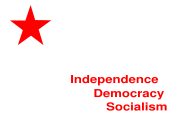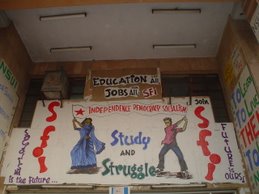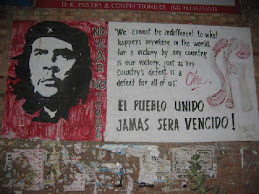
Monday, December 8, 2008
SFI Pamphlet on the Mumbai Terror Attacks dated 2nd Dec, '08
The dreadful terrorist attacks in Mumbai, which according to official estimates have led to the tragic death of at least 183 persons, including 22 foreign nationals, and injured hundreds of others, have shocked the nation. The completion of operations led by the NSG against the heavily armed terrorists at the Taj Palace Hotel on 29th November marked the end of the nightmare, which Mumbai witnessed since the night of 26th November. The terrorists had mindlessly killed innocent civilians in many places including the Chattrapati Shivaji Railway Terminal, Leopold Café, the
While the successful completion of the anti-terror operations in Mumbai has brought some relief, the sheer magnitude and ferocity of these attacks have created deep rooted anguish and insecurity among people across the country. This attack has come in the backdrop of a sharp rise in the number of terrorist attacks across the country over the last few months. Despite growing outrage at the increasing frequency of the terror strikes, the UPA Government has failed to take appropriate steps to effectively deal with the terrorist menace. The belated resignation of the Union Home Minister Shivraj Patil and the callous statement made by the Maharashtra Home Minister RR Patil, leading to his resignation, point towards sheer ineptness at the highest level of the Union and State Governments. The Mumbai terror attacks, while clearly bringing out the rigorous planning and training undergone by the terrorists, have also exposed the glaring gaps in
Immediate and strong steps need to be taken against those forces which are indulging in terrorist activities in the name of religion. Initial investigations into the Mumbai terror attacks suggest the involvement of the extremist group Lashkar-e-Toiba, which is based in
It is also important in the present context to ensure that those political forces in
Sd/- P.K.Anand, President, SFI-JNU. Sd/- Roshan, Secretary, SFI-JNU.
Thursday, November 13, 2008
Tuesday, November 4, 2008
Sunday, September 28, 2008
Wednesday, September 24, 2008
Sunday, September 21, 2008
Saturday, August 2, 2008
Monday, December 3, 2007
Saturday, August 4, 2007
On Verdict on Mumbai Blasts
As we go to press, three more people have been delivered the death sentence by the special TADA court hearing the 1993 Mumbai serial blast case. The total number of those sentenced so far has, thus, gone up to 91 out of the 100 convicted. Of these, eleven have been handed capital punishment while 17 others have been sentenced to life imprisonment. The Mumbai serial blasts, readers will recall, killed over 250 people and injured over 700.
While it is welcome that finally some justice is being delivered in this case of mindless killing of innocent people, it must be remembered that it has taken more than fourteen years for these sentences to be pronounced. Fourteen years is the normal period of time that constitutes life imprisonment. Even now, the convicted can appeal to the Supreme Court against these sentences. Given the track record of the system of delivery of justice in India, one need not be surprised if this process continues to drag on for a long time. Such apprehensions are substantiated by the fact that it has taken nearly two decades for known and identified culprits to be sentenced in the ghastly communal riots in Bhagalpur. The perpetrators of the Maliana (Meerut) communal massacre of 1987 have so far only been legally charge-sheeted! Again, after two decades, the Nanavati Commission had submitted a report on the post-Indira Gandhi assassination killings of Sikhs in 1984, without nailing the culpability of any. The perpetrators of the post-Godhra Gujarat genocide continue to roam free while mountains of circumstantial evidence have not led to the necessary convictions.
Then, there is this glaring case of the findings of the Justice Srikrishna Commission on the post-Babri Masjid demolition, 1992-93 communal riots in Mumbai. In fact, the 1993 blasts were widely propagated as being the response of minority terrorism to the majority terrorism unleashed in the communal riots. Far from taking any action against anybody indicted in the Srikrishna Report, the Shiv Sena-BJP government initially tried to reject this report officially when in government nine years ago. Later they settled for rejecting the report in practice. The subsequent Congress-NCP governments have also failed in ensuring delivery of justice. Yet again, the justice delivery system in our country has failed to convict and punish the perpetrators of communal violence and crimes. These are not the only instances in independent India when justice has simply failed to be delivered to the victims of communal riots. There have been at least five important judicial commissions of enquiry that have submitted their voluminous reports, and yet justice has simply been elusive. These are the Justice P Jaganmohan Reddy Commission of Inquiry into the Ahmedabad Riots of 1969; the Justice D P Madan Commission on the Bhiwandi riots of 1970; the Justice Vithayathil Commission on the Tellicherry riots of 1971; the Justice Jitendra Narain Commission on the Jamshedpur riots of 1979; and the Justice P Venugopal Commission on the Kanyakumari riots of 1982. The Kanyakumari riots were the result of a conflict between Hindus and Christians while the rest have been Hindu-Muslim riots. The RSS was indicted in all of these.
Clearly, the conflicts between different religious communities that inhabit India have all universally denied justice to the victims. For how long can the modern secular Indian republic afford to not improve its justice delivery system in such instances? The question of punishing the perpetrators of communal strife is necessary not only from the viewpoint of humanism and compassion. It is absolutely imperative that justice be delivered in order to strengthen the secular democratic foundations of the modern Indian republic.
There is a universal adage that justice delayed is justice denied. Not only must justice be delivered promptly, but it can never afford to be seen as being partial. While justice in the Mumbai blasts is, to repeat, welcome, the refusal or the reluctance to deliver justice in the various instances mentioned above, only gives the impression that the justice delivery system is not only a system of inbuilt delays but also a system with inbuilt discrimination. At the expense of repeating what we had stated in these columns two weeks ago in relation to some Indians being detained in connection with the Glasgow terrorist attacks, it needs to be underlined that terrorism cannot be associated with any one religion. Terrorism is a crime against humanity that needs to be erased. But this cannot be done by targeting any one specific community as this can only be counterproductive by creating the atmosphere that breeds terrorism’s recruits. We had also noted that even mainstream Hindi cinema (such as Fiza, meaning environment) has chronicled such instances.
In India’s case, the victims of terrorist attacks have been of such a diverse range that the terrorists cannot be straight-jacketed into any single religious group. We have experienced the agonies of attacks on Muslims, Sikhs, Christians, tribals, Hindus, lost two erstwhile prime ministers through terrorist assassinations, Mahatma Gandhi himself a victim of terrorist bullets, in the sixty years since our independence. What is required is to deal effectively with the environment that continues to breed and perpetuate terrorism as the prime minister himself recently stated. A system of delivery of justice that is seen to be discriminatory only vitiates such an environment further. While the other elements crucial to improving such an atmosphere have been detailed by us earlier and the need to be urgently addressed, this aspect of improving the system of delivery of justice needs immediate attention. In the final analysis, the strength of the Republic is measured in its capacity to treat all its citizens equally without any discrimination. The Indian Constitution promises to do so in its very preamble. The incapacity to deliver this promise can only undermine the foundations of the Republic. India cannot simply afford this. The secular democratic foundations of the Indian Republic must be strengthened by strengthening the equality of all before law.
SAY NO TO DISCRIMINATORY JUSTICE SYSTEM
[People’s democracy, july 29, 2007]
















